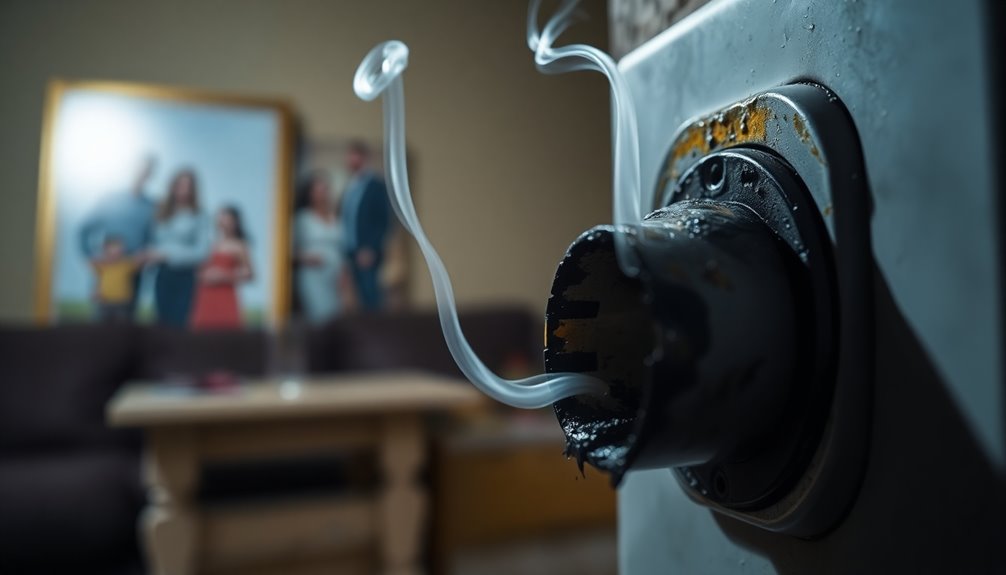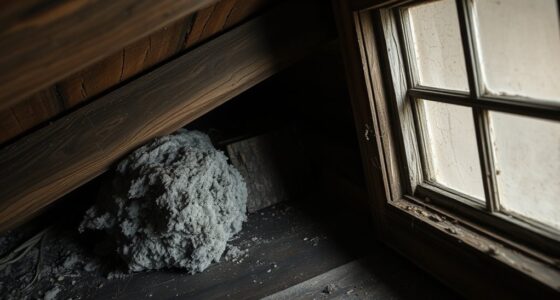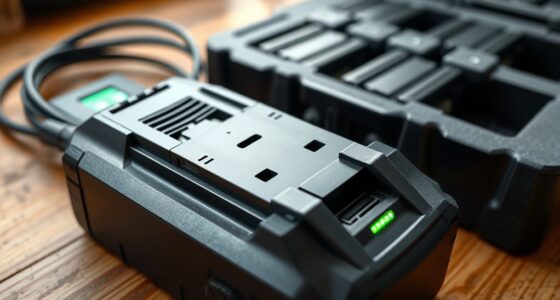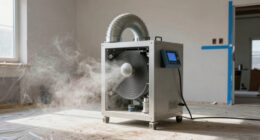If you notice a burning electrical smell, don't ignore it; it's a critical warning that could save your family. This odor often signals serious issues like overloaded circuits, faulty wiring, or malfunctioning appliances. Turn off the main circuit breaker immediately to prevent potential fires and toxic fumes. Keep an eye out for other warning signs, such as hot outlets or frequent circuit breaker trips. Regular inspections and proper maintenance can help you catch problems early. Understanding these hazards is crucial for your safety, and there's much more you can do to protect your home and loved ones.
Key Takeaways
- A burning smell from electrical sources indicates serious issues; turn off the main circuit breaker immediately to prevent fires.
- Common causes include overloaded circuits, faulty wires, and malfunctioning appliances, which can lead to devastating fires.
- Regular inspections of electrical systems can catch hazards early, reducing the risk of fires and ensuring safety compliance.
- Use appropriate safety devices like AFCIs and GFCIs to protect against electrical hazards in your home.
- In case of burning smells, establish an emergency response plan and ensure everyone knows first aid procedures for electrical injuries.
Understanding Electrical Smells

When you notice a burning electrical smell, it's crucial to act quickly, as this odor often signals a serious issue with your electrical system.
Start by turning off the power at the main circuit breaker to stop the electrical supply. Locating the source of the smell can be tricky; it might come from underfloor junction boxes, back boxes, sockets, switches, or the fuse box. Until a licensed electrician resolves the issue, don't use any affected outlets or appliances.
If the smell is strong or you see signs of smoke or fire, evacuate the area immediately. Keep a fire extinguisher nearby, but don't attempt to tackle large electrical fires yourself. Frequent tripping of circuit breakers may also accompany the burning smell, indicating overloaded circuits or faulty wiring.
Ignoring that burning smell can lead to devastating electrical fires that spread rapidly and cause significant damage, alongside releasing toxic fumes that pose serious health risks.
The smell itself can resemble burning plastic or rubber due to melting insulation, often becoming more intense with temperature changes.
Recognizing these odors early can protect your home and family from potential hazards. Always prioritize safety and seek professional assistance when dealing with electrical smells.
Common Causes of Burning Smells

Identifying the common causes of burning smells in your electrical system is essential for maintaining safety in your home. One major issue is overloaded circuits. If you've connected too many devices to a single circuit, it can overheat, especially in older homes with outdated wiring. Frequent circuit breaker tripping is a clear sign of overload, so consider spreading your appliances across different circuits.
Faulty or worn-out wires also contribute to burning smells. Loose or frayed wires can create friction and sparks, leading to overheating. Pay attention to any damage caused by corrosion or rust, as this can compromise cable insulation and increase the risk of short circuits. Regular checks of wiring can help prevent these dangerous situations and ensure your electrical system remains safe. Additionally, ensure that your local fire safety regulations are followed to mitigate fire hazards associated with electrical issues.
Malfunctioning electrical systems and appliances are another concern. Short circuits or defective switches can cause wires to touch, generating heat and odor. If appliances with motors or heating elements are malfunctioning, they may produce burning smells due to dust or grime buildup.
Finally, environmental factors like storm damage or humidity can affect your electrical connections. Improper installation or blocked vents in appliances can lead to overheating, so always keep an eye on these potential hazards.
Identifying Signs of Danger
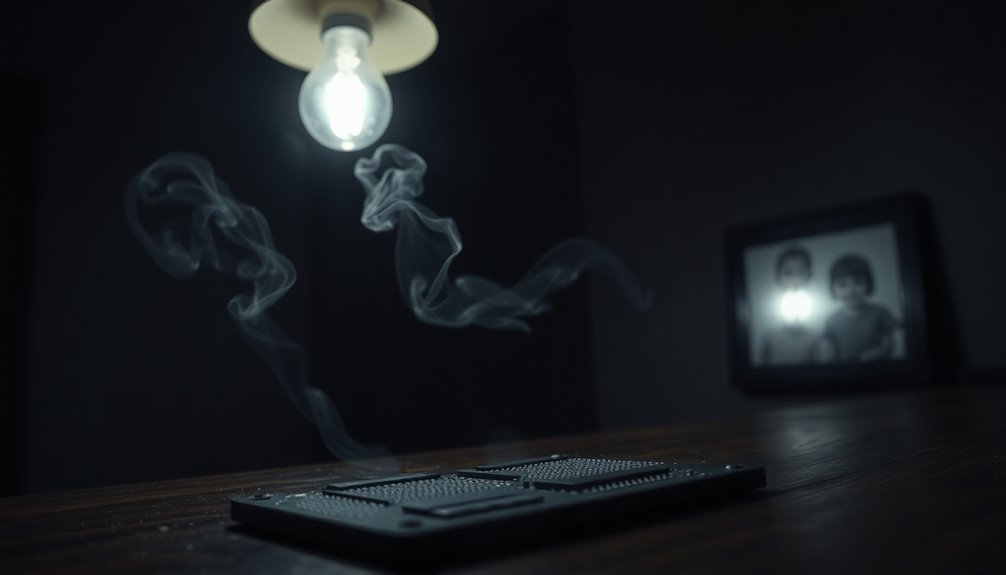
Recognizing the signs of danger in your electrical system is crucial for ensuring your safety. Frequent circuit breaker trips often indicate overloaded circuits, short circuits, or faulty breakers, so don't ignore them. Old or frayed wiring can also contribute to these issues, increasing the risk of failure and potential hazards.
If you notice hot outlets or switches, it's a sign that something's wrong with the electrical load or the device itself. Listen for buzzing or sizzling sounds from outlets, switches, or electrical panels—these noises suggest loose connections or problematic wiring.
Check for charred or discolored outlets and switches, as these may indicate previous sparks or minor electrical fires. Overheated plugs, cords, or switches are also red flags. If you smell a persistent burnt odor with no identifiable source, it could mean short circuits or faulty wiring. Any burning smell requires immediate attention, potentially even a call to the fire department.
Dim or flickering lights can signal voltage fluctuations or overloaded circuits, while bulbs that burn out too fast may suggest underlying electrical issues.
Lastly, be cautious of loose plugs or any shock beyond normal static electricity, as these indicate grounding problems or faulty appliances. Stay vigilant to protect your home and family.
Electrical Fire Warning Signals

Ignoring the warning signs from your electrical system can lead to serious hazards, including fire. Pay attention to outlets and switches that feel hot or show signs of charring or discoloration. A burning odor coming from these areas is a clear indicator that something's wrong. If you see sparks or notice that outlets are warm to the touch, act immediately.
Frequent circuit breaker trips, flickering or dimming lights, and unusual buzzing or sizzling sounds are also crucial signals. These can indicate overloaded circuits or faulty wiring. It's important to remember that electrical fires account for approximately 295 deaths annually in U.S. residential settings. Additionally, using devices like air purifiers with HEPA filtration can help improve indoor air quality, potentially reducing smoke and odor accumulation from electrical issues.
Keep an eye out for old, frayed wires and persistent electrical shocks, which are serious red flags. Visible signs like smoke, scorch marks, or burning smells from electrical components demand your immediate attention.
Never ignore humming or buzzing noises, as they often signify underlying issues. If you find yourself using excessive extension cords or experiencing overheating appliances, these could hint at inadequate wiring or overloading problems.
Always prioritize safety by addressing these warning signals promptly to protect your family and home from potential electrical fires.
Importance of Regular Inspections
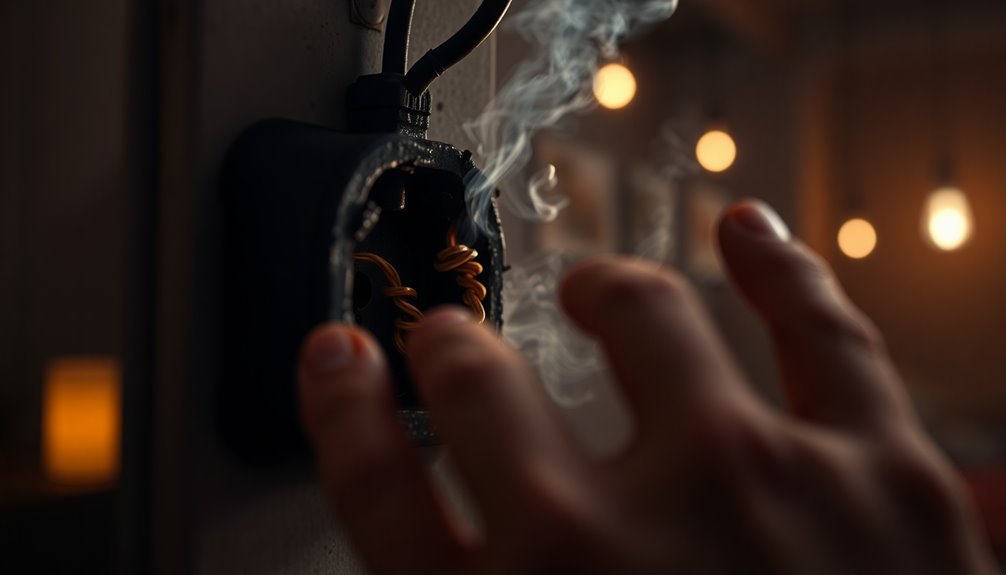
Regular inspections of your electrical system are essential for maintaining safety and efficiency in your home. By catching issues early, you can prevent them from escalating into major problems.
Regular checks help identify faulty wiring or overloaded circuits, significantly reducing the risk of electrical fires—one of the leading causes of home fires in the U.S. This proactive approach not only protects your family but also minimizes the likelihood of accidents or injuries caused by electrical malfunctions. Additionally, regular inspections ensure compliance with electrical safety standards, which is crucial for maintaining a safe environment.
Moreover, regular inspections can save you time and money. Addressing problems promptly prevents costly repairs down the line and reduces the chance of extensive property damage.
You'll also enjoy the benefits of a more efficient electrical system, which can lead to lower energy costs.
Furthermore, ensuring compliance with local electrical safety codes keeps your home up to standard, safeguarding your property value. By maintaining the integrity of your electrical components, you extend their lifespan and ensure their optimal performance.
Ultimately, regular inspections are a crucial step in protecting your home and loved ones from the hidden dangers of electrical issues. Don't wait for a burning smell to prompt action; make inspections a priority.
Safety Tips for Homeowners
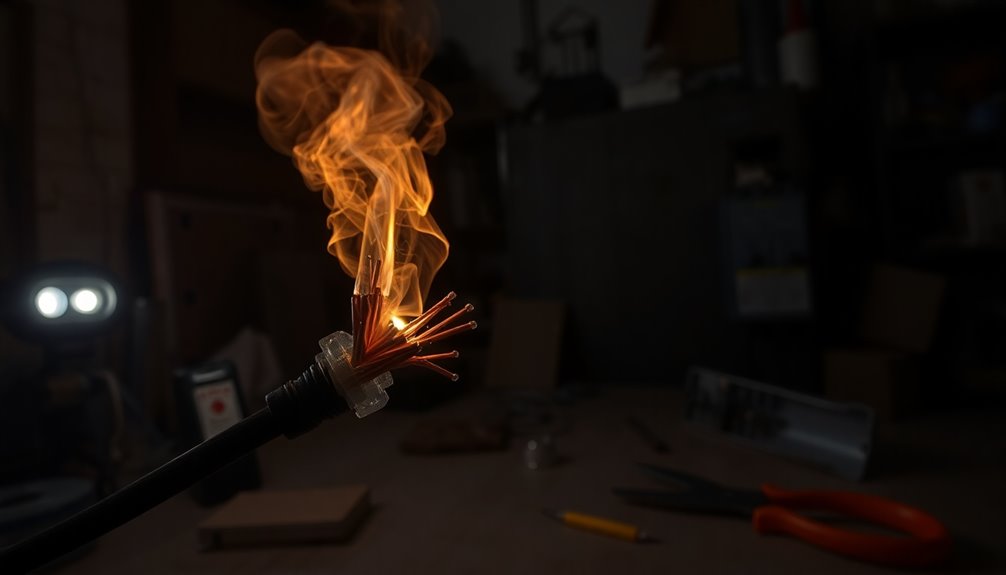
When it comes to electrical safety in your home, staying proactive can make all the difference. Start by avoiding overloading outlets or circuits; this simple step can prevent fires and electrical failures.
Never run cords under carpets or bedding, as these materials can catch fire. If you notice frayed or broken cords, discard them immediately—never splice them together. Ensure plugs fit snugly in outlets to reduce the risk of shock.
Unplug appliances when they're not in use to save energy and minimize fire hazards. Keep flammable items at least three feet away from space heaters and other heat sources. Use only one heat-producing appliance per outlet to prevent overheating. Additionally, regularly inspect extension cords for any signs of damage or wear to help prevent potential hazards.
Also, maintain distance between curtains and lightbulbs to reduce fire risks. Prevent electrical overheating by avoiding placing cords in high-traffic areas or doorways. Always use bulbs with the correct wattage for your lamps.
Plug major appliances directly into wall outlets, steering clear of extension cords. Finally, install safety devices like AFCIs and GFCIs in key areas, and contact a certified electrician for repairs or additional outlets.
Emergency Response Procedures

Electrical safety doesn't stop at prevention; knowing how to respond in an emergency is equally important.
First, identify the source of the burning electrical smell or shock. If it's safe, turn off the power at the circuit breaker or unplug the appliance. If you can't cut the power, use a non-conductive object, like a wooden plank, to move anyone away from the source. Call 911 immediately.
Establish a designated emergency response team trained in handling electrical emergencies. Make sure everyone knows who to contact and when to seek professional help. Develop an emergency action plan that includes assessing the situation, evacuation procedures, and defined roles for personnel. Effective plans minimize response time during emergencies to ensure swift action in critical moments.
If a fire starts, try to cut the power if possible. Use a Class C fire extinguisher for electrical fires; if the power's cut, a Class A extinguisher works for non-electrical fires. If you lack extinguishers, smother flames with a heavy blanket. Never use water on electrical fires.
For anyone injured, start CPR if they aren't breathing. Use an Automated External Defibrillator (AED) if available and follow its instructions. Always provide first aid, even if they seem fine, as symptoms may not be immediate.
Frequently Asked Questions
How Can I Tell if My Wiring Needs Replacing?
To tell if your wiring needs replacing, look for visible signs like discolored outlets or frayed wires.
Pay attention to flickering lights, frequent circuit breaker trips, or any buzzing noises. If you notice warm spots on walls or unexplained odors, that's a red flag.
Also, check for scorch marks and loose connections. If your home is over 50 years old, it's wise to have a professional inspect your wiring for safety.
What Should I Do if I Smell Burning While Using an Appliance?
If you smell burning while using an appliance, first unplug it if it's safe.
Then, locate the breaker box and turn off the circuit connected to that appliance.
Check for any sparks or signs of damage around the area.
Open windows for ventilation and leave the space to avoid inhaling harmful fumes.
Don't attempt to fix it yourself; contact a qualified electrician to assess the situation and ensure your safety.
Are Old Homes More Prone to Electrical Fires?
Yes, older homes are definitely more prone to electrical fires. They often have outdated systems that can't handle today's electrical demands.
You might notice signs like flickering lights or hot outlets. If your home was built before 1973, it's particularly at risk.
Regular inspections by a licensed electrician can help identify potential issues. Upgrading old wiring and outlets can make a significant difference in reducing the risk of electrical fires in your home.
How Often Should I Have My Electrical System Inspected?
You should have your electrical system inspected every 3 to 5 years for standard homes.
This regular check-up helps ensure everything's in good shape and meets safety standards.
If you've had major renovations or installed new systems, get an inspection right after to confirm everything's functioning correctly.
If your home is over 25 years old, consider annual inspections to catch potential issues before they escalate.
It's all about keeping your home safe and efficient.
Can I Fix Electrical Issues Myself or Should I Hire a Professional?
You might be tempted to tackle electrical issues yourself, but it's often safer and more effective to hire a professional.
DIY repairs can lead to costly mistakes and mightn't meet building codes, which could cause legal headaches down the road.
Professionals have the right tools and expertise to ensure your system is safe and functional.
Plus, they can spot hidden problems that you might overlook.
It's best to prioritize safety and quality over savings.
Conclusion
In conclusion, if you ever notice a burning electrical smell in your home, don't ignore it! This could be a crucial warning sign of potential danger. By understanding the causes and recognizing the signs, you can protect your family and property. Regular inspections and being proactive with safety measures are essential. Remember, when in doubt, always prioritize safety. If you suspect a problem, act fast and call a professional to ensure your home stays safe and secure.
